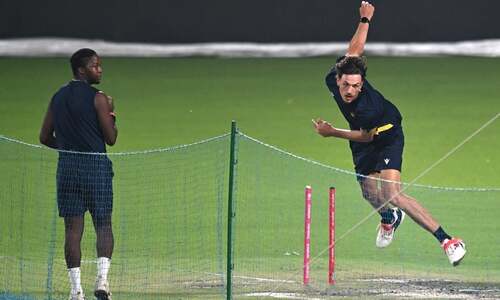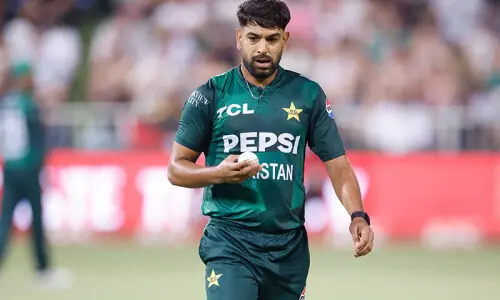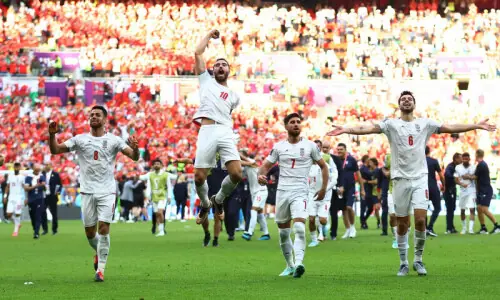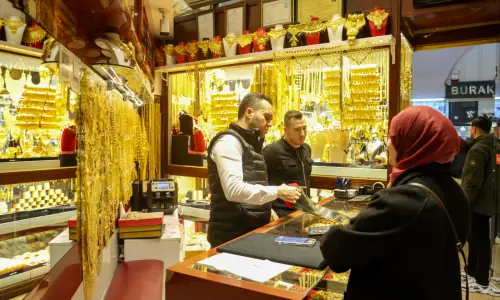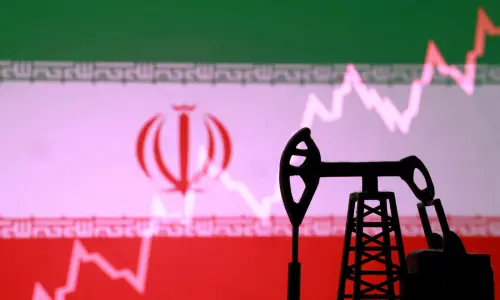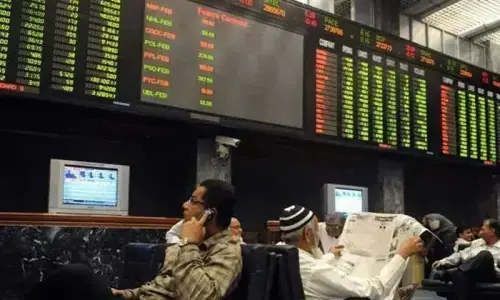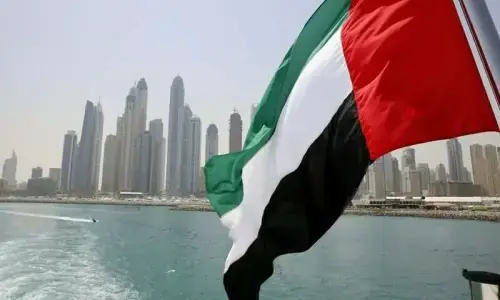In the previous parts, I discussed the humble beginnings of football in Pakistan from independence (1947), early growth, the ‘Golden Age’ of the 1960s followed by a sudden, ‘Dark Age’ throughout the 1970s that stunted the potential growth of beautiful game in the country. The gloom was somewhat lifted in the early half of the 1980s as Pakistan scratched and scrapped itself back from the international wilderness with a new, bold, but grossly inexperienced generation of players who strived to bring back the joy on the face of football lovers in the country.
The increased participation of the national team at various youth and senior levels across Asia in the coming years was to prove vital for Pakistan’s reemergence on the international scene. However, politics would have a decisive say in what path the game followed. The increased televised coverage of world football, in particular the FIFA World Cup, on national television meant a bigger fan base was created but much more was needed to give the game a boost in the country.
Despite falling short for qualifying to the 1984 AFC Asian Cup finals, the mid 1980s began a sudden burst of regular international action that caught our footballers hard and fast.
Emergence of South Asian football competitions
The latter half of the 1980s saw Pakistan host the 3rd and 4th Quaid-i-Azam International Championships in the Aprils of 1985 and 1986. Nepal, Bangladesh, Indonesia, North Korea were among the others invited to take part.
Most importantly, however, was football becoming a regular event in the nascent South Asian Games. After declining to send a football team for the first edition held at Kathmandu in 1984, Pakistan decided to take part in the 1985 event that hosted by Dhaka, Bangladesh. Pakistan won their group featuring Nepal (won 3-2), Maldives (won 3-1), and the hosts Bangladesh (lost 1-2) but failed to qualify for the final. Up until the mid-1990s, football at the South Asian Games was recognised as a senior level competition. Now, it is limited as a U-23 event.
That same year, the Asian Football Confederation brought back the Asian Champions’ Cup (also known as Asian Club Championship) for the club champions of Asia after a 14 year absence. The last event in 1971 was won by Israeli side Maccabi Tel Aviv who now play in UEFA region. PIA, having won the 1984 Inter Provincial Championship, was elected to become Pakistan’s first representative in Asian club football. They were placed in a tricky qualifying group for the 1985-86 Asian Club Championship hosted in Colombo, Sri Lanka and involving the winners from India, Bangladesh, the hosts, Maldives, and Nepal. Only Indian giants East Bengal qualified for the next round from the group as PIA finished 6 points behind in 4th place out of a group of 6 teams. The eventual winner of the competition was South Korea’s Daewoo Royals (Pusan) who beat Saudi side, and final hosts, Al-Ahly Jeddah 3-1 in late January 1986.
The subsequent Asian club participations, including the Asian Cup Winners’ Cup, didn’t bring much glory either as Habib Bank (1986-87), PAF (1987-88), Crescent Textile Mills Faisalabad (1988-89), and even a Punjab FC side (1989-90) could only get the odd points against weaker sides from Maldives or Nepal whilst being put to the sword by clubs from Bangladesh, Iraq, India, Oman in their qualifying groups.
This was an era where South Asia had become the permanent whipping boys for rest of Asia in both club and national team competitions. The increasing professionalism, fitness levels, coaching, and player awareness that had become ingrained in the rest of the Asian region meant that South Asia had miles to go.
After losing 2-0 in a friendly against Iran in Tehran in Feb 1986, Pakistan’s national team took part in 1986 Asian Games where they lost to UAE (0-1), Iraq (1-5, a penalty by Ghulam Sarwar ‘Teddy’), Oman (1-3), and Thailand (0-6). The tough draws against the well-established Asian sides certainly did not help but nevertheless it was some much needed practice for the boys. After Pakistan was knocked out by Nepal during qualification for 1988 Olympics in April 1987, the country hosted the 5th Quaid-i-Azam International Tournament in Lahore. A month later in October, Pakistan won bronze under the captaincy of Zafar Iqbal in the 1987 South Asian Games football tournament hosted by India. The team was coached by late German manager Burkhard Ziese who remained in charge from 1987 till 1989-90.
This was followed by more defeats in qualification for 1988 Asian Cup at the hands of Jordan (0-1), Japan (1-4), Kuwait (0-3) and qualifying group hosts Malaysia (0-4).
The year 1989 began with Pakistan’s first ever participation for the FIFA World Cup qualifying rounds for Italia 1990 in January-February. One wonders why Pakistan Football Federation (PFF) had been missing so many World Cup qualifiers for almost 40 years!
That being said, Pakistan had always been playing a vital role in the World Cups for many years before our actual participation. The sports goods industry of Sialkot had been providing millions of footballs around the world, peaking during World Cup seasons, since 1980. The Adidas ‘Tango’ balls used in the 1982 World Cup hosted by Spain was Pakistan’s major contribution to the beautiful game thanks to the hard work of Sialkot manufacturers. That tradition is still alive today and Sialkot is still a major contributor on the international market.
The qualifiers saw Pakistan teamed up against much stronger sides in Kuwait and UAE. They were easily knocked out one at a time by the Middle East giants. UAE eventually qualified for Italia 1990 as one of the two Asian sides alongside World Cup regulars South Korea. These defeats would be regarded as good practice as Pakistan hosted the 1989 South Asian Games later that year. The football team went on a brilliant run that eventually led to a gold medal win in the final over Bangladesh (1-0) thanks to a solitary goal by WAPDA’s Haji Abdul Sattar. In terms of international competitions, this was arguably Pakistan’s first ever football final victory at all levels. Football circles across the country celebrated this victory with great aplomb. Everyone called this the beginning of a brand new era for Pakistani football.
By this time, hockey was experiencing a decline and cricket had more or less taken full attention of the Pakistani public thanks no less to the exploits of Javed Miandad, Imran Khan, and a young Wasim Akram in Sharjah as well as around the world. Football was still fighting for attention.
1990s: Politics impedes Progress
The demise of Zia-ul-Haq in 1988 reopened Pakistan for civilian rule but what promised for a great democratic era for the country eventually turned into a mockery of political instability. Political rivalries between the two main parties caught in the musical chairs of power, PPP and PML would take their battles outside the parliament into other supposedly non-political arenas.
Football became a hot bed for such activity as well. The year 1990 was marked by the general elections of the PFF. PML stalwart from Lahore, Mian Muhammad Azhar, went on to narrowly win the elections for PFF Presidency by just one vote. The losing candidate unfortunate for not getting the decisive vote in 1990 was PPP heavyweight Faisal Saleh Hayat.
Mian Azhar held onto power until 2003. While many people would cite the importance of stability in sports federations in the long run, Mian Azhar’s 13-year tenure would have its plenty of thrills, chills, and spills! A year after those elections, the PFF General Secretary post went to Jamaat-e-Islami MNA and football enthusiast from Lahore, Hafiz Salman Butt. Hafiz Salman would hold the post for a mere three years until Mian Azhar forced him out because of growing political rifts as well as invoking a ten-year ban from FIFA on Hafiz Salman over alleged ‘abuse of power’ as a PFF Official in 1995.
The 1991-94 era is, however, often regarded as the best administrative era of Pakistani football. Hafiz Salman was instrumental in organising the National Championships of 1992-93 and 1993-94 (won by PIA and Army respectively) structured on a proper league-style basis and spread over a number of months. Hafiz Salman also managed to get a lucrative three-year sponsorship deal with Lifebuoy Soap. The amount of Rs 35 million was used to organize the said championships.
The media campaign for football in that era was aggressive with football-centric ads on PTV for the renowned soap brand as well as a hit television drama series called ‘Red Card’ produced by PTV Lahore Centre.
The satellite TV boom and live matches from English Premiership and other top leagues in Europe would soon follow in Pakistan.
With Hafiz Salman’s dismissal in 1994 and ban by FIFA and PFF in 1995, Pakistani football fell once again into an era of political incompetence, mismanagement and lethargy that put paid to the progress made. Even today, no long term sponsors for Pakistani football exist.
In the international arena, Pakistan regained gold at the 1991 South Asian Games football under the captainship of Ghulam Sarwar ‘Teddy’ when the side coached by the late Muhammad Aslam Japani won the final against Maldives 2-0. The goals were scored by the late Qazi Ashfaq and Army’s Nauman Khan. However, Asian Cup qualification for 1992 and World Cup qualifications for USA’94 would be a bitter experience. Iran and India quickly disposed of our boys 0-7 and 0-2 for Asian Cup qualifying in July 1992, while Iraq, China, Yemen, and Jordan eased past us for World Cup qualification in May-June 1993. Subsequent qualification campaigns for France ’98 and Korea-Japan 2002 would also end prematurely as the stronger Middle Eastern and East Asian teams would have their way.
The year1993 was the first time the SAFF Championship was held in Pakistan, although the team disappointed the home crowds with an unsatisfactory performance finishing in 4th place. The SAFF Championship was then called the SAARC Football Gold Cup. The subsequent SAFF Championships of 1995, 1997, and 1999 would present a similar story; although Pakistan did finish 3rd in 1997 while India dominated the competition with 3 wins out of 4 with a Sri Lanka triumph in 1995.
Qazi Ashfaq was one the best players of this generation as he possessed skill, speed, leadership and passion for the game throughout his playing career however his untimely death in November 13, 2001 robbed this country of a great player and aspiring coach.
Nauman Khan, now a serving Lt. Colonel, retired from the game a few years ago and is current manager of the Pakistan Army football team.
The 1990s also saw the emergence of the indomitable defender Haroon Yousaf. The Mandi Bahauddin native would become a multiple national champion for WAPDA and ABL as well as captain of Pakistan national team in late 1990s until his retirement. Haroon played 51 full internationals for Pakistan and scored 3 goals between 1992 and 2003. Yousaf still plays today as the captain of PMC Athletico Faisalabad in Pakistan Premier League where he recently inspired the team from the brink of relegation by beating intimidating hosts Afghan FC Chaman 1-0 in final game of the 2010 season.
Other great players from late 1980s to late 1990s were Sharafat Ali, Qazi Ashfaq, Zafar Iqbal, Mukhtar Ahmed, Tariq Hussain, Haroon Yousaf, Ghulam Sarwar, Matin Akhtar, Imtiaz Butt, Noshad Baloch, Saleem Patni, Abdul Wahid Jr., Captain Noman, Syed Nasir Ali, Abdul Rasheed, Ejaz Ahmed, Naeem Gul, Zulfiqar Dogar, Bashir Ahmed and Khalid Butt
The Story of Wohaib FC and domestic football in Pakistan
Hafiz Salman Butt was also the founder and chairman of Wohaib FC (Hafiz Wohaib Butt Memorial Football Club). It was established in 1982 in memory of Butt’s slain brother and football lover Hafiz Wohaib Butt. By the early 1990s, Wohaib FC had developed itself in to the premier club in Lahore. It would provide aspiring footballers the chance to represent at national level and attract full-time jobs at various departments later on like Wapda, Railways, Army, PIA, ABL and HBL.
Wohaib FC put on stellar performances at the 1992-93 Asian Club Championship where they beat clubs from Bahrain and Bangladesh to qualify for Group B. After being trounced 10-1 by Dubai club Al-Wasl in the opening fixture, they came back and drew 1-1 with Iranian side, and eventual Asian champions that year, PAS Tehran FC in their final group game. For their efforts, Wohaib FC was ranked 5th place in Asian Club Championship that year. A feat that has never been repeated by a Pakistani team since!
According to former Wohaib FC star and current Model Town Football Club & Academy head coach Khaled Khan,, one reason of Wohaib’s staggering show that year was the fact that it was essentially the Pakistan national team in disguise! Before AFC had begun putting more strict rules and regulations for player registrations, it was not uncommon to see many club sides across Asia ‘borrowing’ players from other teams for registration to compete at Asian club competitions like their own national teams. Wohaib FC had borrowed players like Zafar Iqbal ‘Mama’ (PIA), goalkeeper Mateen Akhtar (WAPDA), and Nauman Khan (Army) who combined with Wohaib’s best talent to take part in the 1992-93 Asian Club Championship.
Hafiz Salman’s sacking from PFF also affected Wohaib FC as departments took away their best talent and the ones that stayed behind were not given the chances they deserved for selection in national team for many years.
This was an era when departments would continue to dominate the domestic competitions but most of them failed to give any noteworthy performances in Asian competitions. Some refused to even show up because of extra costs.
PIA was fast losing ground as the 1990s drew to an end, winning their last of 9 national championships in 1997. Wapda, Army, and (before their disbanding in early 2000s) ABL took over as the dominant sides in Pakistan. The physically dominant game of Punjab teams, had over-taken the flair of Karachi football by then. But that did not do much for the national sides as they still had a lot to do internationally.
2000s: The New Millennium and Pakistani football
The turn of the century saw Pakistan remain stuck in South Asian mediocrity as politics in the PFF as well as provincial FAs, rivalries between various officials (current and former), limited government budgets, and poor administration held game back. Football survived in the country based purely on annual grants received from FIFA and AFC for development projects for developing nations.
Nearly a million US dollars annually would be pocketed by each national FA (including PFF) from there on to improve football infrastructure in each country. These grants helped built the PFF Football House as part of the FIFA GOAL Project on Ferozepur Road, Lahore in mid-2000s. Further GOAL Projects in other cities like Karachi, Peshawar, Quetta are in the pipeline but no further step has been taken by PFF in their implementation for years!
The national team got the appointment of Englishman Daved Burns and then John Layton as head coaches between 2000 till 2002 thanks to AFC support. Slovak coach Joseph Herel was also part of AFC support programs as he took charge from 2002 till 2003. These coaches helped bring a level of stability in the side as well as discovering new talent across Pakistan through various trials and training camps held nationwide at youth levels. The likes of future Pakistan captains Muhammad Essa and Jaffar Khan emerged onto the scenes because of these programs as a new look Pakistan tried to make a mark in international competitions. Muhammad Essa would eventually inspire the now defunct PTCL team to win the 2003 PFF President’s Cup.
In fact it was during the tenure of John Layton that the Pakistan team embarked on an ambitious tour of England in late March 2001 in preparation for the upcoming 2002 World Cup qualifiers with the help of UK-based Pakistani business communities. The tour saw Pakistan play a few friendly matches against English sides where they played friendly games against the then English Second Division side Bury FC (lost 3-0; Indian legend Baichung Bhutia scoring against us once again), and Premiership team Coventry City (2-0), as well as losing to an amateur level London ABSA team. The games were broadcast live in Pakistan on PTV and featured players like Haroon Yousaf, Sarfraz Rasool, Jaffar Khan and Tanveer Ahmed. One assumes that PTV still possesses footage from these games in their archives.
The World Cup qualifiers after these games also resulted in losses to Lebanon, Thailand and Sri Lanka. However, Pakistan did earn a thrilling 3-3 draw with Sri Lanka in the return leg of the World Cup qualifiers thanks to a stunning hat-trick by Gohar Zaman. But the disappointment of another qualification failure was obvious.
The domestic structure was in desperate need of revamping to bringing the best out of the player under capable coaches at all levels- something which Pakistan had been lacking for decades.
The SAFF Cup of January 2003 held in Bangladesh brought a lot of surprises to the game. Under the inspiration of attacking midfielder Sarfraz Rasool of KRL, Pakistan stunned giants India (1-0), Sri Lanka (2-1) and Afghanistan (1-0) as they reached the semi-finals only to fall short against Maldives 1-0 and losing the 3rd/4th place game against India 2-1 as hosts Bangladesh won the final on penalties against Maldives. Sarfraz Rasool top scored with 4 goals in the tournament and was declared Asian Player of the Month for his performance. World Cup and Asian Cup qualification afterwards were still disappointing though as Kyrgyzstan and Singapore cut us out in respective campaigns.
The year 2003 was also the year that finally ended the 13 year rule of Mian Azhar as PFF President. Thanks to the campaigning of the still-banned Hafiz Salman Butt, Faisal Saleh Hayat won the PFF general elections to become President of the PFF. Mian Azhar had gradually fallen out of favour from the pro-Musharraf PML-Q faction over the years while Faisal Saleh Hayat’s own pro-Musharraf PPP faction had been making headways in run-up to the 2003 General Elections where he became Interior Minister of Pakistan later that year as well. Pakistani politics, it seems, will always have a say in everything.
2003 was also the year FootballPakistan.Com (FPDC) was established as a genuine independent non-profit football website striving for the progress, promotion, prosperity, and professionalism of Pakistani football through volunteer efforts.
To be continued…
*Special thanks to the Co-Founder, Webmaster, and Chief Editor of FPDC Malik Riaz Hai Naveed, veteran football journalist Riaz Ahmed, and the Pakistan Football Federation (PFF) for providing the information that helped create this article chronicling the history for Pakistani football.*
The writer is the chief editor, Pakistan correspondent and forum administrator of FootballPakistan.Com and would like to thank the co-founder, webmaster, and chief editor of FPDC Malik Riaz Hai Naveed, veteran football journalist Riaz Ahmed, and the Pakistan Football Federation for providing information that helped create this article chronicling the history for Pakistani football.





